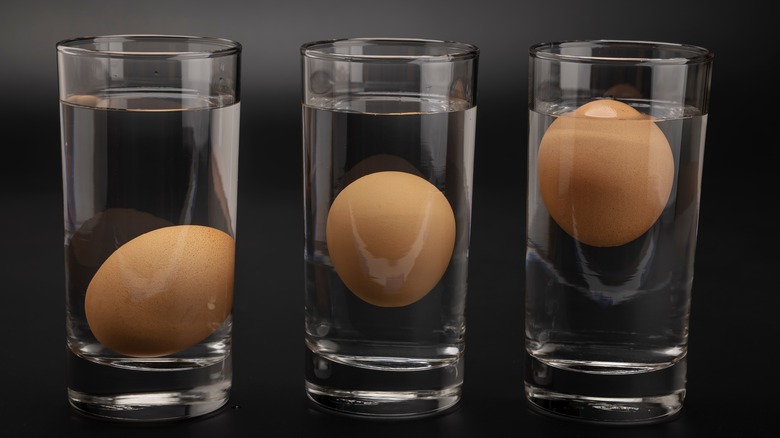Gets Eggs To Room Temperature In No Time With A Glass Of Water
Perhaps you're in the middle of whipping up an exquisitely delicate angel food cake, and it's time to start creaming the butter, sugar, and eggs together. But then you realize you've somehow overlooked the part in the recipe that says to use room temperature eggs and the only ones that you have are now sitting cold in the refrigerator. Fret not, such oversights are far too easy to make when baking and, luckily, there is a very easy way to fix it.
The quickest way to bring eggs to room temperature is to soak them in a warm water bath. All it takes is five to 10 minutes for the heat of the water to warm the eggs to room temperature — it's as easy as that. The only thing to keep in mind here is that you want the water to be tepid enough for cold eggs to warm up, but not so hot that you end up cooking them into jammy soft-boiled eggs.
If 10 minutes also seems like too much of a wait, you could place the bowl of eggs under running warm water to make things quicker. But, if doing so, make sure that the force of the running water isn't too harsh because you don't want the eggs to start cracking.
Separated eggs require a different approach
While placing cold eggs in a bowl of warm water is an effective way to bring them to room temperature, this trick only works for whole eggs that are still in their shells. If you're working with separated eggs and need room temperature whites and yolks in a jiffy, you'll need to take a slightly different approach.
Eggs tend to separate better when they are cold because they hold their shape more effectively at lower temperatures. When you take that into account, it may actually be more advisable to begin with cold eggs when you need to separate them, and then bring the yolks and whites to room temperature individually.
To do so, you should separate the yolks and whites into small bowls and then place the individual bowls in slightly bigger vessels filled with warm water. Once again, the key is to keep the temperature of the water tepid as opposed to hot, and you'll have room temperature yolks and whites in as little as five minutes.
Why warm water is a safe way to work with eggs
Refrigerated eggs can come to room temperature in half an hour when left on the counter, so the merits of using warm water can seem dubious if you're not in a rush. However, changing the temperature of poultry requires some care. The USDA says chicken eggs should be stored in a refrigerator as soon as you buy them to minimize the risk of Salmonella. Once they are stored that way, bringing them to room temperature by simply leaving them on the counter can be tricky. The temperature change can cause cold eggs to sweat, which can then cause harmful bacteria to multiply. While guidelines cap the exposure of eggs at room temperature to two hours (one hour if the room temperature is above 90 degrees Fahrenheit), you may want to be careful about keeping eggs out for too long.
Room temperature usually clocks in at 68 to 77 degrees Fahrenheit, but the USDA warns that anything between 40 to 140 degrees Fahrenheit is a danger zone for poultry, where bacteria can double in a matter of 20 minutes. Rather than maintaining this careful balance of temperatures, it might make more sense to leave eggs in the refrigerator until the very last minute. And then use the warm water trick to bring them to room temperature 10 or so minutes before you're ready to use them, and you'll be all set to start cooking without a fuss.



